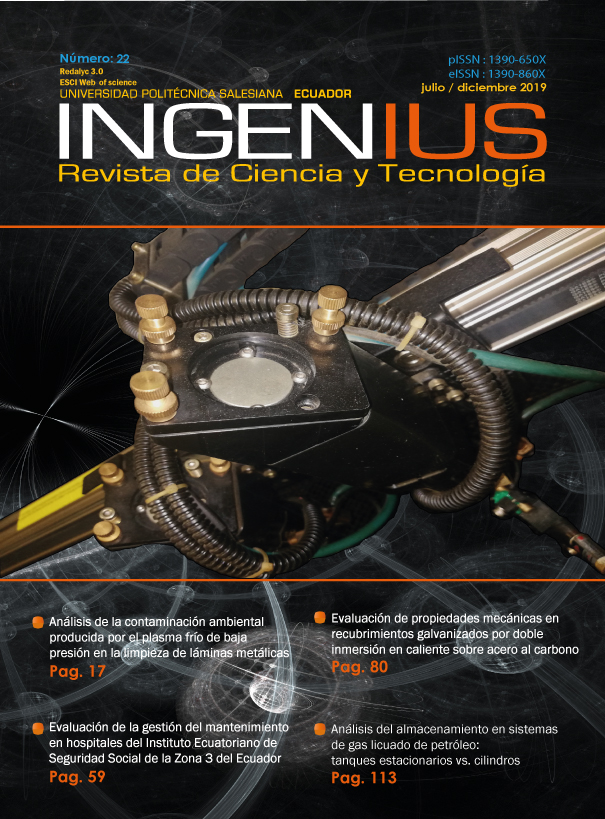Detection of Faults in Combustion Engines Through Indicators of Temperature and Injection Pressure
Main Article Content
Abstract
Keywords
fallas, presión, inyección, temperatura, cámara de combustión, mantenimiento, grupos electrógenos failure, pressure, injection, temperature combustion chamber, maintenance, generator sets
References
[2] J. G. Boza, “Estudio de estabilidad en un sistema eléctrico con grupos electrógenos,” Revista de Ingeniería Energética, vol. 28, no. 2, pp. 26–28, 2007. [Online]. Available: http://bit.ly/2F1S6BD
[3] J. F. Quintana Tamayo, F. Martínez Pérez, Y. G. Vázquez Jorge, and J. Ramírez Arzuaga, “Estudio de factibilidad para optimizar frecuencia de reemplazo del lubricante, en grupos electrógenos,” Revista Ciencias Técnicas Agropecuarias, vol. 3, no. 23, pp. 60–68, 09, 2014. [Online]. Available: http://bit.ly/31iGFz3
[4] P. Mendonça, E. Bonaldi, L. de Oliveira, G. Lambert-Torres, J. B. da Silva, L. B. da Silva, C. Salomon, W. Santana, and A. Shinohara, “Detection and modelling of incipient failures in internal combustion engine driven generators using electrical signature analysis,” Electric Power Systems Research, vol. 149, pp. 30–45, 2017. [Online]. Available: https://doi.org/10.1016/j.epsr.2017.04.007
[5] W. Xi, Z. Li, Z. Tian, and Z. Duan, “A feature extraction and visualization method for fault detection of marine diesel engines,” Measurement, vol. 116, pp. 429–437, 2018. [Online]. Available: https: //doi.org/10.1016/j.measurement.2017.11.035
[6] K. Lee, J. Cha, S. Ko, S.-Y. Park, and E. Jung, “Fault detection and diagnosis algorithms for an open-cycle liquid propellant rocket engine using the kalman filter and fault factor methods,” Acta Astronautica, vol. 150, pp. 15–27, 2018. [Online]. Available: https://doi.org/10.1016/j.actaastro.2018.03.001
[7] P. Czech, G. Wojnar, R. Burdzik, L. Konieczny, and J. Warczek, “Application of the discrete wavelet transform and probabilistic neural networks in ic engine fault diagnostics,” Journal of Vibroengineering, vol. 16, pp. 1619–1639, 2014. [Online]. Available: http://bit.ly/2XBwbIF
[8] J. Flett and G. M. Bone, “Fault detection and diagnosis of diesel engine valve trains,” Mechanical Systems and Signal Processing, vol. 72-73, pp. 316–327, 2016. [Online]. Available: https://doi.org/10.1016/j.ymssp.2015.10.024
[9] E. Carvajal Trujillo, F. J. Jiménez-Espadafor, J. A. Becerra Villanueva, and M. Torres García, “Methodology for the estimation of cylinder inner surface temperature in an air-cooled engine,” Applied Thermal Engineering, vol. 31, no. 8, pp. 1474–1481, 2011. [Online]. Available: https://doi.org/10.1016/j.applthermaleng.2011.01.025
[10] J. R. Aguilar-Otero, R. Torres-Arcique, , and D. Magaña Jiménez, “Análisis de modos de falla, efectos y criticidad (AMFEC) para la planeación del mantenimiento empleando criterios de riesgo y confiabilidad,” Tecnología, Ciencia, Educación, vol. 25, pp. 15–26, 2010. [Online]. Available: http://bit.ly/2I8mAnx
[11] J. Moubray, Mantenimiento centrado en la confiabilidad. Industrial Press Inc., 2004. [Online]. Available: http://bit.ly/2Izu4yC
[12] F. Scarpatti, “Análisis de modos de fallas y sus efectos,” Scarpatti y Asociados. Consultores en Gestión Organizacional, Tech. Rep., 2001. [Online]. Available: http://bit.ly/2F2mprX
[13] D. C. Montgomery, Design and Analysis of Experiment. John Wiley & Sons, 2008. [Online]. Available: http://bit.ly/2WyxprV
[14] J. C. Rocha-Hoyos, E. A. Llanes-Cedeño, S. Celi-Ortega, and D. Peralta-Zurita, Efecto de la mezcla de biodiesel en el rendimiento y la opacidad del motor diesel. Información Tecnológica, 2019.
[15] Y. Guardia-Puebla, J. Márquez-Delgado, V. Sánchez-Girón, E. A. Llanes-Cedeño, J. C. Rocha-Hoyos, and D. B. Peralta-Zurita, “Mejoras a la asignatura diseño estadístico de experimentos para estudiantes de la carrera de Ingeniería Mecánica,” Revista Espacios, vol. 39, no. 30, pp. 10–25, 2018. [Online]. Available: http://bit.ly/2KJbs2e
[16] F. Martínez Pérez and A. Barroso Moreno, “Aplicación de la tribología y el análisis de la causa raíz (RCA) en motores de combustión interna,” Ingeniería Mecánica, vol. 3, pp. 53–56, 2008. [Online]. Available: http://bit.ly/2IA0ppd
[17] D. Fernández-Fernández and F. Mourdoch-Misa, “Aplicación de técnicas de lubricación predictivas en grupos electrógenos,” Ingeniería Mecánica, vol. 12, no. 2, pp. 1–8, 2009. [Online]. Available: http://bit.ly/2F3vbpw
[18] K. Riplová, “Tool of risk management: failure mode and effects analysis and failure modes, effects and criticality analysis,” Journal of Information, Control and Management Systems, vol. 5, no. 1, pp. 111–120, 2007. [Online]. Available: http://bit.ly/2KbKm4i
[19] O. Martínez Rodríguez and S. A. Dorrbercker Drake, “Determinación de las prioridades de mantenimiento en turbogeneradores “Elektrosila TB-100-3600-T3” a partir del comportamiento de sus fallos,” Ingeniería Energética, vol. 33, no. 3, pp. 250–262, 2012. [Online]. Available: http://bit.ly/2Rak4zR
[20] S. Wu and D. Clements-Croome, “Ratio of operating and maintenance costs to initial costs of building services systems,” Cost Engineering, vol. 49, no. 12, pp. 30–33, 2007. [Online]. Available: http://bit.ly/2Ialckl
[21] S. You-Cheng, X. Min, G. Yong, C. Yi, S. Lei, and D. Kang-yao, “Effects of injection pressure, exhaust gas recirculation and intake pressure on the cycle-to-cycle variations of HCCI combustion,” Journal of the Energy Institute, vol. 89, no. 2, pp. 293–301, 2016. [Online]. Available: https://doi.org/10.1016/j.joei.2015.01.017
[22] A. K. Agarwal, D. K. Srivastava, A. Dhar, R. K. Maurya, P. C. Shukla, and A. P. Singh, “Effect of fuel injection timing and pressure on combustion, emissions and performance characteristics of a single cylinder diesel engine,” Fuel, vol. 111, pp. 374–383, 2013. [Online]. Available: https://doi.org/10.1016/j.fuel.2013.03.016
[23] S. Gowthaman and A. Sathiyagnanam, “Effects of charge temperature and fuel injection pressure on hcci engine,” Alexandria Engineering Journal, vol. 55, no. 1, pp. 119–125, 2016. [Online]. Available: https://doi.org/10.1016/j.aej.2015.12.025
[24] E. A. Llanes-Cedeño, J. C. Rocha-Hoyos, Y. Guardia-Puebla, L. Tipanluisa, and G. Velastegui, “Análisis comparativo de los gases residuales de la combustión y fallas en motores Hyundai modelo 9h21/32, en estación de generación eléctrica distribuida,” INNOVA Research Journal, vol. 2, no. 3, pp. 27–41, 2017. [Online]. Available: http://bit.ly/2R5PE1P



